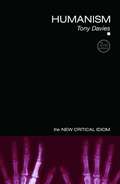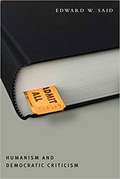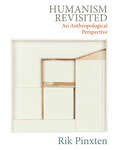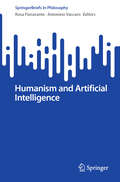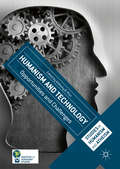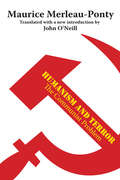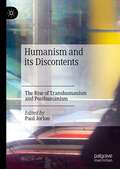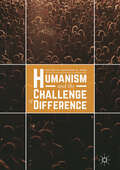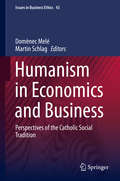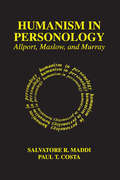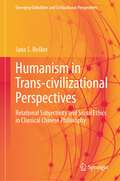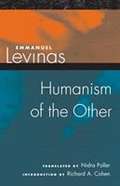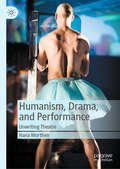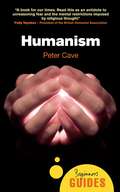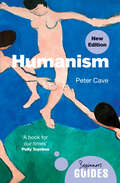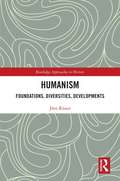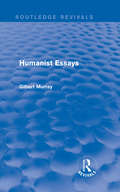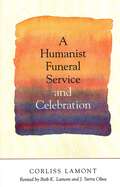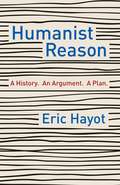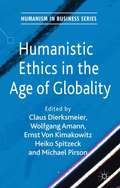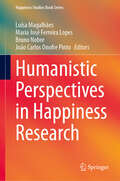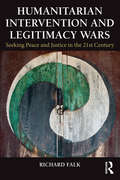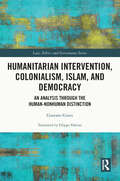- Table View
- List View
Humanism (The New Critical Idiom)
by Tony DaviesDefinitions of humanism have evolved throughout the centuries as the term has been adopted for a variety of purposes – literary, cultural and political – and reactions against humanism have contributed to movements such as postmodernism and anti-humanism. Tony Davies offers a clear introduction to the many uses of this influential yet complex concept and this second edition extends his discussion to include: a comprehensive history of the development of the term and its influences theories of post-humanism, cybernetics and artificial intelligence implications of concepts of humanism and post-humanism on political and religious activism discussion of the key figures in humanist debate from Erasmus and Milton to Chomsky, Heidegger and Foucault a new glossary and further reading section. With clear explanations and poignant discussions, this volume is essential reading for anyone approaching the study of humanism, post-humanism or critical theory.
Humanism And Democratic Criticism (Columbia Themes In Philosophy)
by Edward W. Said Akeel BilgramiIn the radically changed and highly charged political atmosphere that has overtaken the United States―and to varying degrees the rest of the world―since September 11, 2001, the notion that cultures can harmoniously and productively coexist has come to seem like little more than a quaint fiction. In this time of heightened animosity and aggression, have humanistic values and democratic principles become irrelevant? Are they merely utopian fantasies? Or are they now more urgent and necessary than ever before? Ever since the ascendancy of critical theory and multicultural studies in the 1960s and 1970s, traditional humanistic education has been under assault. Often condemned as the intolerant voice of the masculine establishment and regularly associated with Eurocentrism and even imperialism, the once-sacred literary canon is now more likely to be ridiculed than revered. While this seismic shift―brought on by advances in technological communication, intellectual specialization, and cultural sensitivity―has eroded the former primacy of the humanities, Edward Said argues that a more democratic form of humanism―one that aims to incorporate, emancipate, and enlighten―is still possible. A lifelong humanist, Said believed that self-knowledge is the highest form of human achievement and the true goal of humanistic education. But he also believed that self-knowledge is unattainable without an equal degree of self-criticism, or the awareness that comes from studying and experiencing other peoples, traditions, and ideas. Proposing a return to philology and a more expansive literary canon as strategies for revitalizing the humanities, Said contends that words are not merely passive figures but vital agents in historical and political change. Intellectuals must reclaim an active role in public life, but at the same time, insularity and parochialism, as well as the academic trend toward needless jargon and obscurantism, must be combated. The "humanities crisis," according to Said, is based on the misperception that there is an inexorable conflict between established traditions and our increasingly complex and diversified world. Yet this position fails to recognize that the canonized thinkers of today were the revolutionaries of yesterday and that the nature of human progress is to question, upset, and reform. By considering the emerging social responsibilities of writers and intellectuals in an ever more interdependent world and exploring the enduring influence of Eric Auerbach's critical masterpiece, Mimesis, Said not only makes a persuasive case for humanistic education but provides his own captivating and deeply personal perspective on our shared intellectual heritage.
Humanism Revisited: An Anthropological Perspective
by Rik PinxtenThe West emancipated itself from the old humanism long ago and in doing so distanced itself from ‘heteronomy’: it declared that man, and not a non-human power, should be the first reference to approach people and nature. Today, as heirs of this tradition, we are still stuck in Eurocentrism (and often racism), and now even threaten to ruin nature by destroying biodiversity and causing the climate to warm up dangerously. Applied through an anthropological perspective, this book calls for a NEED-humanism: Not-Eurocentric, Ecological and (economically) Durable approach that can help promote inclusion and pluralism.
Humanism and Artificial Intelligence (SpringerBriefs in Philosophy)
by Antonino Vaccaro Rosa FioravanteThis book contributes to the debate on humanism in AI by providing a, so far lacking, comprehensive account of the significant challenges posed by AI to organizations from a humanistic perspective. It does so in two ways: by discussing ethical challenges of AI using humanistic assumptions, normative implications, and underpinning theoretical stances and by focusing on those challenges that can be considered well suited to be tackled from a humanistic perspective as they are more urgent for humanistic-led organizations, as well as those willing to become so. This new perspective allows for new and important discussions, making the book an important read for philosophers of technology and AI.
Humanism and Technology
by Anthony B. PinnThis book interrogates the ways in which new technological advances impact the thought and practices of humanism. Chapters investigate the social, political, and cultural implications of the creation and use of advanced forms of technology, examining both defining benefits and potential dangers. Contributors also discuss technology's relationship to and impact on the shifting definitions we hold for humankind. International and multi-disciplinary in nature and scope, the volume presents an exploration of humanism and technology that is both racially diverse and gender sensitive. With great depth and self-awareness, contributors offer suggestions for how humanists and humanist organizations might think about and relate to technology in a rapidly changing world. More broadly, the book offers a critical humanistic interrogation of the concept of "progress" especially as it relates to technological advancement.
Humanism and Technology: Opportunities and Challenges (Studies in Humanism and Atheism)
by Anthony B. PinnThis book interrogates the ways in which new technological advances impact the thought and practices of humanism. Chapters investigate the social, political, and cultural implications of the creation and use of advanced forms of technology, examining both defining benefits and potential dangers. Contributors also discuss technology’s relationship to and impact on the shifting definitions we hold for humankind. International and multi-disciplinary in nature and scope, the volume presents an exploration of humanism and technology that is both racially diverse and gender sensitive. With great depth and self-awareness, contributors offer suggestions for how humanists and humanist organizations might think about and relate to technology in a rapidly changing world. More broadly, the book offers a critical humanistic interrogation of the concept of “progress” especially as it relates to technological advancement.
Humanism and Terror: The Communist Problem
by Maurice Merleau-PontyRaymond Aron called Merleau-Ponty "the most influential French philosopher of his generation." First published in France in 1947, Humanism and Terror was in part a response to Arthur Koestler's Darkness at Noon, and in a larger sense a contribution to the political and moral debates of a postwar world suddenly divided into two ideological armed camps. For Merleau-Ponty, the central question was: could Communism transcend its violence and intentions?The value of a society is the value it places upon man's relation to man, Merleau-Ponty examines not only the Moscow trials of the late thirties but also Koestler's re-creation of them. He argues that violence in general in the Communist world can be understood only in the context of revolutionary activism. He demonstrates that it is pointless to ask whether Communism respects the rules of liberal society; it is evident that Communism does not.In post-Communist Europe, when many are addressing similar questions throughout the world, Merleau-Ponty's discourse is of prime importance; it stands as a major and provocative contribution to limits on the use of violence. The argument is placed in its current context in a brilliant new introduction by John O'Neill. His remarks extend the line of argument originally developed by the great French political philosopher. This is a major contribution to political theory and philosophy.
Humanism and its Discontents: The Rise of Transhumanism and Posthumanism
by Paul JorionThis book explains that while posthumanism rose in opposition to the biblical contention that ‘Man was created in the image of God’, transhumanism ascertained the complementary view that ‘Man has been assigned dominion over all creatures’, further exploring a path that had been opened up by the Enlightenment’s notion of human perfectibility.It explains also how posthumanism and transhumanism relate to deconstruction theory, and on a broader level to capitalism, libertarianism, and the fight against human extinction which may involve trespassing the boundary of the skin, achieving individual immortality or dematerialization of the Self and colonisation of distant planets and stars.Two authors debate about truth and reason in today’s world, the notion of personhood and the legacy of the Nietzschean Superhuman in the current varieties of anti-humanism.
Humanism and the Challenge of Difference
by Anthony B. PinnThis book explores the implication of diversity for humanism. Through the insights of academics and activists, it highlights both the successes and failures related to diversity marking humanism in the US and internationally. It offers a timely depiction of how humanism in general as well as how particular humanist communities have wrestled with the nature of our changing world, and the issues that surface in relationship to markers of difference.
Humanism and the Culture of Renaissance Europe
by Charles G. NauertIn this updated edition of his classic account, Charles Nauert charts the rise of humanism as the distinctive culture of the social, political and intellectual elites in Renaissance Europe. He traces humanism's emergence in the unique social and cultural conditions of fourteenth-century Italy and its gradual diffusion throughout the rest of Europe. He shows how, despite its elitist origins, humanism became a major force in the popular culture and fine arts of the fifteenth and sixteenth centuries, and the powerful impact it had on both the Protestant and Catholic Reformations. He uses art and biographical sketches of key figures to illuminate the narrative and concludes with an account of the limitations of humanism at the end of the Renaissance. The revised edition includes a section dealing with the place of women in humanistic culture and an updated bibliography. It will be essential reading for all students of Renaissance Europe.
Humanism in Economics and Business
by Martin Schlag Domènec MeléThis book offers different perspectives on Humanism as developed by Catholic Social Teaching, with a particular focus on its relevance in economics and business. The work is composed of three sections, covering what is meant by Christian Humanism, how it links with economic activity, and its practical relevance in the business world of today. It reviews the historical development of Christian Humanism and discusses the arguments which justify it in the current cultural context and how it contributes to human development. The book argues that the current recognition of human dignity and the existence of innate human rights are both ultimately rooted in Christian Humanism. It sets out the importance of the concept for economic activities, and how Christian Humanism can serve as a metaphysical foundation and ethical basis for a social market economy. Applying Christian Humanism to business leads to the centrality of the person in organizations and to seeing the company as a community of persons working together for the common good. Three thought-provoking case studies illustrate the wide-reaching positive impacts of applying Christian Humanism in the organization.
Humanism in Personology: Allport, Maslow, and Murray
by Paul CostaThrough analysis of the lives and theories of the three major exponents of humanism, Allport, Maslow, and Murray, the authors have marshaled some compelling arguments for an alternative to the extreme behaviorism of Skinner and the logical positivism of Freud. This work is a concise, clear synthesis of both broad theoretical positions and specifi c concepts that underlie humanistic psychology.
Humanism in Trans-civilizational Perspectives: Relational Subjectivity and Social Ethics in Classical Chinese Philosophy (Emerging Globalities and Civilizational Perspectives)
by Jana S. RoškerThis book introduces into the current global ethics debate models of humanism developed in classical Chinese traditions, which have not yet been comprehensively presented to Western scholarship or integrated into the framework of global discourses on social ethics and morality. It creates new paradigms for an understanding of humanism that meets the demands of our time. It begins by presenting European descriptions and critical assessments of this discourse, and then moves to an exploration of humanistic ideas shaped through historical developments in Asia, with a focus on the Chinese tradition. In this sense, the book is written from a transcivilizational perspective. The methods used in the research transcend---that is, surpass and overcome---the rigid, isolating, and essentialist concept of civilization. At the same time, the book points to the possibility of transformation through the exchange of knowledge and ideas between different civilizations. Within this framework, the book starts from the assumption that the ontology of civilizations and cultures is not based on immutable substances, but on the relations between different factors that constitute them as categories. The transcivilizational perspective rooted in transcultural dialogues between philosophies that originated in different cultures and civilizations is particularly valuable because of the globalized world in which we live today. This means that the problems that affect people in different parts of the world and the issues that are embedded in different geopolitical and developmental frameworks also affect all of humanity. This book is of particular interest to scholars and students of global ethics, globalization, Asian philosophy and Sinology.
Humanism of the Other
by Richard Cohen Emmanuel Levinas Nidra Poller<p>In Humanism of the Other, Emmanuel Levinas argues that it is not only possible but of the highest exigency to understand one's humanity through the humanity of others. Based in a new appreciation for ethics, and taking new distances from the phenomenology of Hegel, Heidegger, Husserl, and Merleau-Ponty, the idealism of Plato and Kant, and the skepticism of Nietzsche and Blanchot, Levinas rehabilitates humanism and restore its promises. <p>He expresses disappointment with the revolutions that became bureaucracies and totalitarian governments, and the national liberation movements that eventually led to oppression and international wars. Defining the human as subject, ego, synthesis, identification, cognition, and mood all too easily lead to subjugation, persecution, and murder. <p>Painfully aware of the long history of dehumanization which reached its apotheosis in Hitler and Nazism, Levinas does not underestimate the difficulty of reconciling oneself with another. The humanity of the human, Levinas argues, is not discoverable through mathematics, rational metaphysics or introspection. Rather, it is found in the recognition that the suffering and mortality of others are the obligations and morality of the self.</p>
Humanism, Drama, and Performance: Unwriting Theatre
by Hana WorthenThis book examines the appropriation of theatre and theatrical performance by ideologies of humanism, in terms that continue to echo across the related disciplines of literary, drama, theatre, and performance history and studies today. From Aristotle onward, theatre has been regulated by three strains of critical poiesis: the literary, segregating theatre and the practices of the spectacular from the humanizing work attributed to the book and to the internality of reading; the dramatic, approving the address of theatrical performance only to the extent that it instrumentalizes literary value; and the theatrical, assimilating performance to the conjunction of literary and liberal values. These values have been used to figure not only the work of theatre, but also the propriety of the audience as a figure for its socializing work, along a privileged dualism from the aestheticized ensemble—harmonizing actor, character, and spectator to the essentialized drama—to the politicized assembly, theatre understood as an agonistic gathering.
Humanism: A Beginner's Guide (Beginner's Guides)
by Peter CaveWhy should we believe in God without any evidence? How can there be meaning in life when death is final? Does a Godless universe imply moral relativism? With adherents including Einstein, Freud, Philip Pullman, and Frank Zappa, and often described as the thinking person's religion, Humanism aims to make sense of such questions by appealing to shared human values, rationality, and tolerance. This lively and provocative book is essential reading for atheists, agnostics, freethinkers, rationalists, sceptics, and believers alike. Peter Cave is a writer, presenter, and lecturer in philosophy at The Open University and City University, London.
Humanism: A Beginner's Guide (updated edition) (Beginner's Guides)
by Peter CaveLife does not become empty and meaningless in a godless universe. This is the contention at the heart of humanism, the philosophy concerned with making sense of the world through reason, experience and shared human values. In this thought-provoking introduction, Peter Cave explores the humanist approach to religious belief, ethics and politics, and addresses key criticisms. Revised and updated to confront today&’s great crises – the climate emergency and global pandemics – and the future of humanism in the face of rapid technological advancement, this is for anyone wishing to better understand what it means to be human in the twenty-first century.
Humanism: Foundations, Diversities, Developments (Routledge Approaches to History)
by Jörn RüsenThe book describes humanism in a systematic and historical perspective. It analyzes its manifestation and function in cultural studies and its role in the present. Within the book, special attention is given to the intention of contemporary humanism to overcome ethno-centric elements in the cultural orientation of contemporary living conditions and to develop humane dimensions of this orientation. This is linked to a fundamental critique of the current post-human self-understanding of the humanities. Furthermore, the intercultural aspect in the understanding of humanism is emphasized; for non-Western cultures also have their own humanistic traditions. Two further aspects are also addressed: the Holocaust as the most radical challenge to humanistic thinking and the relationship of humanism to nature. Sitting at the intersection of history and philosophy, the book is perfect for those exploring humanism from an historical perspective.
Humanist Essays (Routledge Revivals)
by Gilbert MurrayFirst published in 1964, this is a short collection of both literary and philosophical essays. Whilst two essays consider Greek literature written at the point at which the Athenian empire was breaking apart, another group explore the background from which Christianity arose, considering Paganism and the religious philosophy at the time of Christ. These, in particular, display Gilbert Murray’s ‘profound belief in ethics and disbelief in all revelational religions’ as well as his conviction that the roots of our society lie within Greek civilization. Finally, there is an interesting discussion of Order and the motives of those who seek to overthrow it.
Humanist Funeral Service and Celebration
by Corliss LamontFirst published in 1940, this book has been helpful for over half a century to people not comfortable with the religious format of typical funeral services. The author, renowned humanist Corliss Lamont, last revised the text in 1977. Now, from her own experience as a humanist chaplain, Beth K. Lamont, widow of Corliss Lamont, has added two new scripts of humanist services, and has welcomed a new updated edition by humanist J. Sierra Oliva. Mr. Sierra has added new dimensions and a new emphasis on celebrating the deceased's life in these suggested scripts for last rites. As in earlier versions of the book, there are meditations and eloquent passages of prose and poetry to express appreciation, grief, and farewell when a friend or loved one dies. One may choose according to individual preference the text and music deemed to be most appropriate. The service is dignified and reminiscent of past relationships with the deceased, stressing love, the beauty of life, the human kinship with nature, and the naturalness of death. In the quest for solace at a time of grief, one can turn to this nonreligious service for security, comfort, and purpose in accepting the finality of the loss of a loved one.
Humanist Reason: A History. An Argument. A Plan
by Eric HayotAsk just about any humanist, and you will hear that the humanities are in a crisis. Facing utilitarian approaches to education, the corporatization of the university, plummeting enrollments, budget cuts, and political critiques from right, left, and center, humanists find themselves on the defensive. Eric Hayot argues that it is time to make a positive case for what the humanities are and what they can become.Hayot challenges scholars and students in the humanities to rethink and reconsider the work they do. Examining the origins of the humanist ethos in nineteenth-century Germany and tracing its philosophical roots back to Immanuel Kant, Hayot returns to the history of justifications for the humanities in order to build the groundwork for their future development. He develops the concept of “humanist reason” to understand the nature of humanist intellectual work and lays out a series of principles that undergird this core idea. Together, they constitute a provocative intellectual and practical program for a new way of thinking about the humanities, humanist thought, and their role in the university and beyond. Rather than appealing to familiar ethical or moral rationales for the importance of the humanities, Humanist Reason lays out a new vision that moves beyond traditional disciplines to demonstrate what the humanities can tell us about our world.
Humanistic Ethics in the Age of Globality
by Claus Dierksmeier Wolfgang Amann Michael Pirson Ernst Von Kimakowitz Heiko SpitzeckCultures and moral expectations differ around the globe, and so the management of corporate responsibilities has become increasingly complex. Is there, however, a humanistic consensus that can bridge cultural and ethnic divides and reconcile the diverse and contrary interests of stakeholders world-wide? This book seeks to answer that question.
Humanistic Perspectives in Happiness Research (Happiness Studies Book Series)
by Luísa Magalhães Maria José Ferreira Lopes Bruno Nobre João Carlos Onofre PintoThis volume provides innovative perspectives on the scholarly connection between the humanities and happiness, and considers the narrative expressions of happiness and recent investigations about happiness, its metrics, and objective insights about human wellbeing. This volume relates intemporal humanistic values to views across social and behavioural sciences, and thereby covers a broad interdisciplinary frame, from philosophy, psychology, literary studies, to the communication sciences. The philosophers in this volume discuss the achievement of happiness through the cultivation of virtue, as well as the logic of the gift as an experience of personal fulfilment and the fact that happiness is inextricably linked to hope. Their chapters take on the approach of the permanent human struggle to generate global horizons of happiness and thus attain eternal bliss. Scholars from other fields of the humanities and communication sciences consider the positive messages of environmental happiness in virtual platforms, where the Homo digitalis finds happiness at the click of a button, often under the endorsement of celebrities, or under the visual fruition of playful objects. They also present the intertextual memory of happiness as a condition for humanistic research. Finally, this volume considers the sphere of education as the best place in which to apply the results of sustainable happiness measurement and research, and to realize this complementary, humanistic perspective on happiness research.
Humanitarian Intervention and Legitimacy Wars: Seeking Peace and Justice in the 21st Century
by Richard FalkIn the aftermath of the Cold War there has been a dramatic shift in thinking about the maintenance of peace and security on a global level. This shift is away from a preoccupation with how to prevent major wars between sovereign states to a preoccupation about non-state transnational warfare and violence and strife within states in a world order that continues to be juridically and politically delimited by spatial ideas of national sovereignty and national independence as signified by international boundaries. In this book, Richard Falk draws upon these changes to examine the ethics and politics of humanitarian intervention in the 21st Century. As well as analysing the theoretical and conceptual basis of the responsibility to protect, the book also contains a number of case studies looking at Iraq, Afghanistan, Kosovo and Syria. The final section explores when humanitarian intervention can succeed and the changing nature of international political legitimacy in countries such as India, Tibet, South Africa and Palestine. This book will be of interest to students of International Relations theory, Peace Studies and Global Politics.
Humanitarian Intervention, Colonialism, Islam and Democracy: An Analysis through the Human-Nonhuman Distinction (Law, Ethics and Governance)
by Gustavo GozziThis book offers a critical analysis of the European colonial heritage in the Arab countries and highlights the way this legacy is still with us today, informing the current state of relations between Europe and the formerly colonized states. The work analyses the fraught relationship between the Western powers and the Arab countries that have been subject to their colonial rule. It does so by looking at this relationship from two vantage points. On the one hand is that of humanitarian intervention—a paradigm under which colonial rule coexisted alongside “humanitarian” policies pursued on the dual assumption that the colonized were “barbarous” peoples who wanted to be civilized and that the West could lay a claim of superiority over an inferior humanity. On the other hand is the Arab view, from which the humanitarian paradigm does not hold up, and which accordingly offers its own insights into the processes through which the Arab countries have sought to wrest themselves from colonial rule. In unpacking this analysis the book traces a history of international and colonial law, to this end also using the tools offered by the history of political thought. The book will be of interest to students, academics, and researchers working in legal history, international law, international relations, the history of political thought, and colonial studies.
